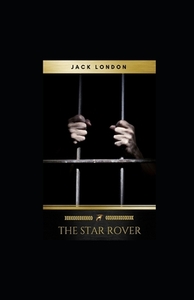Take a photo of a barcode or cover
adventurous
dark
emotional
reflective
sad
medium-paced
Plot or Character Driven:
A mix
Strong character development:
Yes
Loveable characters:
Complicated
Diverse cast of characters:
No
Flaws of characters a main focus:
No
dark
mysterious
reflective
medium-paced
Plot or Character Driven:
A mix
Strong character development:
Complicated
Loveable characters:
Yes
Diverse cast of characters:
Yes
Flaws of characters a main focus:
Complicated
Un veemente phamplet contro la pena di morte e di denuncia sulle condizioni disumane delle prigioni americane. Questo avrebbe potuto essere questo libro di London senza gli intermezzi durante i quali il protagonista sfugge alla propria condizione ripercorrendo le sue esistenze passate, compresa l'inevitabile testimonianza alla predicazione di Gesù.
Questi intermezzi sono il punto debole del libro, dedicati come sono al concetto superomistico sempre presente in London.
La descrizione delle prigioni, il sordido abbrutimento, la violenza gratuita in una istituzione che dovrebbe invece essere correttiva, non sono molto dissimili da quello che potrebbe scrivere London ancora oggi, soprattutto per le prigioni americane.
Questi intermezzi sono il punto debole del libro, dedicati come sono al concetto superomistico sempre presente in London.
La descrizione delle prigioni, il sordido abbrutimento, la violenza gratuita in una istituzione che dovrebbe invece essere correttiva, non sono molto dissimili da quello che potrebbe scrivere London ancora oggi, soprattutto per le prigioni americane.
Although too many a non-American reader Jack London is best known for his stories set in the wild, what I like the most in his work are the stories about broken lives.
The Star Rover is about a man in prison whose only way to escape is to imagine different places, different landscapes. All of London's poetic imagery shines in this story.
The Star Rover is about a man in prison whose only way to escape is to imagine different places, different landscapes. All of London's poetic imagery shines in this story.
This book is what would be called a fix-up novel in today's world. A number of unrelated short stories are tied together with a framing device. The most compelling story is, in fact, the framing story. A prisoner is held in solitary confinement and tortured by his sadistic guards and warden. The pain and injustice of his situation is truly moving and exposes the awful conditions of American prisons of the early 20th Century (and to some degree to this day). A couple of the time-travel stories were also pretty interesting. The story of the boy in a wagon train crossing the Utah desert besieged by angry Mormons and attacked by Indians, and the story of the sailor shipwrecked on a cold, rocky island were powerful character studies combined with tense action. Overall, despite the variation in effectiveness of the stories, I found this novel to be well written and thought provoking.
adventurous
emotional
inspiring
reflective
medium-paced
Plot or Character Driven:
Character
Strong character development:
Complicated
Loveable characters:
Yes
Diverse cast of characters:
No
Flaws of characters a main focus:
N/A
inspiring
Stravagante
Jack London non si tradisce, neanche sperimentando un registro fantastico.
La prosa è sempre molto scorrevole, anche avvincente a tratti, e la trama insolita.
Molto buona la versione audio.
Jack London non si tradisce, neanche sperimentando un registro fantastico.
La prosa è sempre molto scorrevole, anche avvincente a tratti, e la trama insolita.
Molto buona la versione audio.
Woah. This one was real difficult for me to finish. According to the review here I was still kind of hoping for a twist but it didn’t come. The idea behind the story is not bad but it was really difficult for me to get into the story. Once I was invested in one of the stories, it ended and it switched to another one. So even though I wanted to enjoy it, it just didn’t do it for me.
Having read "The Sea-Wolf" and "Call of the Wild", I expected this novel to be another story of adventure and comradeship, but "The Star Rover" is much more experimental than those novels. At the opening, meet Darrell Standing, who has been imprisoned for murder and is waiting to be hanged. He undergoes excruciating torment by being regularly shut in a straight-jacket, sometimes for periods of ten days. London gives the reader an account of the inhumanity and torture in prisons, and as an indictment of the prison system this is a very valuable novel. My edition also contained two poignant forwards written by "lifers" in prisons in the 1990s.
However, the novel's focus moves beyond the world of prison. Darrell discovers that while he is straight-jacketed, he can enter into his past lives, and re-experience lives lived generations ago. Darrell claims to be able to return to the lives of primordial creatures, and that during his spirit's time on earth he has experienced all possible lives. Though he is going to be hanged, he can never die: his spirit lives on forever, inhabiting different bodies.
It's interesting to see London explore this idea, and the novel's structure feels unusual and original. However, London is constrained by his own imagination. Though Darrell is supposed to experience all kinds of lives, London only seems capable of writing about white, strong men, who are respected by those around them and are resourceful and beloved by women. This means the idea behind the book doesn't real come off: because London only writes Darrell as experiencing lives similar to his own, the idea feels constrained, and the premise comes to seem silly rather than revolutionary. If London's imagination had stretched further, this would be a much more satisfying book.
However, the novel's focus moves beyond the world of prison. Darrell discovers that while he is straight-jacketed, he can enter into his past lives, and re-experience lives lived generations ago. Darrell claims to be able to return to the lives of primordial creatures, and that during his spirit's time on earth he has experienced all possible lives. Though he is going to be hanged, he can never die: his spirit lives on forever, inhabiting different bodies.
It's interesting to see London explore this idea, and the novel's structure feels unusual and original. However, London is constrained by his own imagination. Though Darrell is supposed to experience all kinds of lives, London only seems capable of writing about white, strong men, who are respected by those around them and are resourceful and beloved by women. This means the idea behind the book doesn't real come off: because London only writes Darrell as experiencing lives similar to his own, the idea feels constrained, and the premise comes to seem silly rather than revolutionary. If London's imagination had stretched further, this would be a much more satisfying book.





